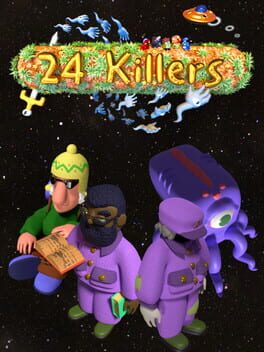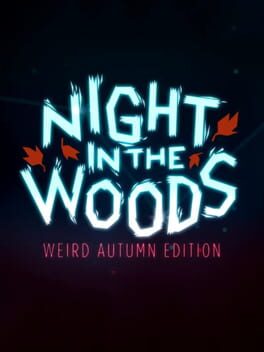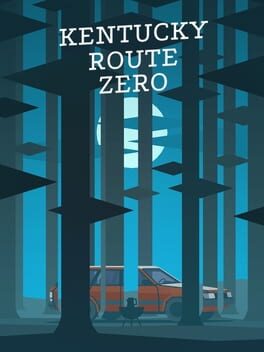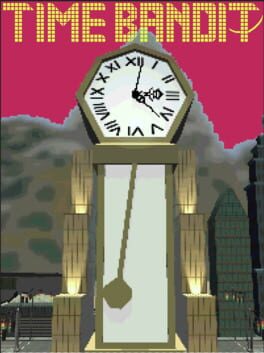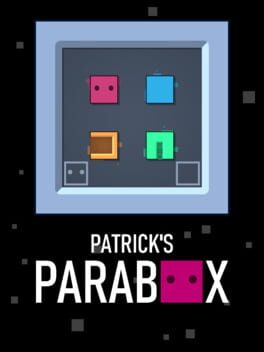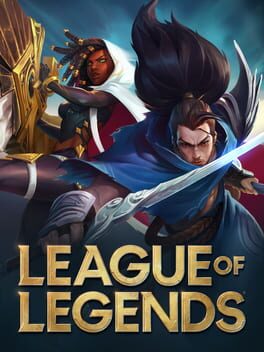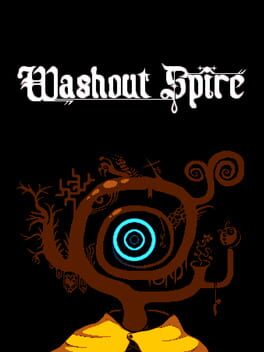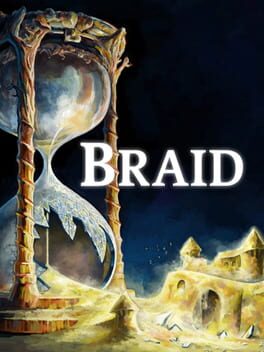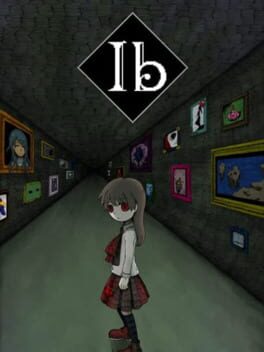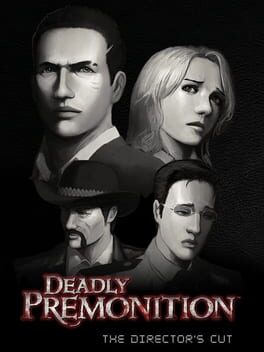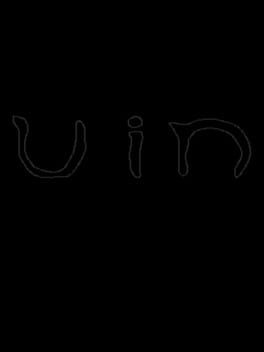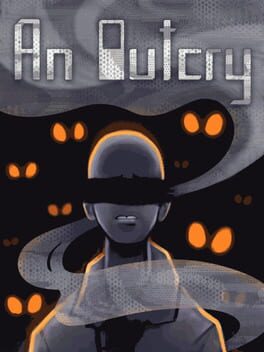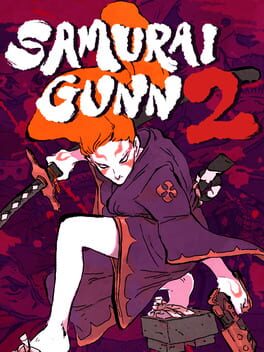QuinnK
2023
mannnn. 24 killers may just be my favourite thing ive played this year so far. and you wouldnt guess it at a superficial glance - it looks fairly quaint if you dont try it for yourself. "a moon rpg clone, a love-de-lic-like"... when people try to capture a game like that, the pigeonholing of it kind of covers up all nuance in a homogenising white paint, huh?
but 24 killers is absolutely not its inspirations - not exclusively. what 24 killers does better than every single other game ive seen (even ones ive spent more time with!) is flavour. everything oozes charme, everyone has personality to spare. its language is almost like a bit of a code - "man" (the interjection) becomes "mon"; "fuck" becomes "foam"; "garbage" is always gabbage. its remarkably consistent, and the grooves of its writing arent disturbing, but familiar and warm.
it is also truly a kind game - kind on your patience, and your time, and your care. it isnt wasteful; when it asks you to wait, it knows you have that moment to spare. its like a long-lost friend that you hit it right back off on your first meeting in ages.
more than any other game ive played in recent years, 24 killers has made me smile wide and giggle adoringly at a funny turn of phrase, or an imaginative design, or a silly character.
yes, it feels sometimes like its held together with duct tape, and some small visual polishes are missing - but rather than take away from it, they betray a humanity, the hands that touched its creation.
i remember when its demo hit during a steam next fest that the developer played it with his son; and even though its a game where people smoke (the moon does, too!) and kalashnikovs are strewn about the place, it feels like it really does suit both the grown-up developer to play it, AND his kid, and anyone at the ages in-between.
thank you, happy shabby games. not shabby at all - youve made me very happy with your little island; it really feels like home.
but 24 killers is absolutely not its inspirations - not exclusively. what 24 killers does better than every single other game ive seen (even ones ive spent more time with!) is flavour. everything oozes charme, everyone has personality to spare. its language is almost like a bit of a code - "man" (the interjection) becomes "mon"; "fuck" becomes "foam"; "garbage" is always gabbage. its remarkably consistent, and the grooves of its writing arent disturbing, but familiar and warm.
it is also truly a kind game - kind on your patience, and your time, and your care. it isnt wasteful; when it asks you to wait, it knows you have that moment to spare. its like a long-lost friend that you hit it right back off on your first meeting in ages.
more than any other game ive played in recent years, 24 killers has made me smile wide and giggle adoringly at a funny turn of phrase, or an imaginative design, or a silly character.
yes, it feels sometimes like its held together with duct tape, and some small visual polishes are missing - but rather than take away from it, they betray a humanity, the hands that touched its creation.
i remember when its demo hit during a steam next fest that the developer played it with his son; and even though its a game where people smoke (the moon does, too!) and kalashnikovs are strewn about the place, it feels like it really does suit both the grown-up developer to play it, AND his kid, and anyone at the ages in-between.
thank you, happy shabby games. not shabby at all - youve made me very happy with your little island; it really feels like home.
2012
This review contains spoilers
you know what? fuck it. spec ops: the line is worth five stars and then some. for a long time i sat on the fence about it, and had it collecting dust, uncommentated, at 4.5 stars - no more.
the fact this game was shuffled out-of-sight by 2k games, that an attempt is being made to erase its existence from the public under dubious pretenses at worst, or that it's been dropped in a double-whammy of corporate greed and convenient timing at best, shows us that this game is just as sorely needed now as it was 12 years ago.
many like to do a little joking about its "look what i made you do"-narrative, but those people are unaware that this precise portrayal of leadership at the hands of a vague authority is part of the point. this is taking down not merely the modern military shooter alone, but the entirety of the military industrial complex and its implications. the game design here is a direct analogue of the military chain of command, and the way it attempts to dissuade individuals and society as a whole from seeking blame in the hands of the actor.
on february 25th 2024, united states airforce member aaron bushnell self-immolated rather than continuing to maintain part in the u.s. military's support of yet another genocide - a genocide funded and fueled by this global force for despicable violence, a genocide committed, in part, with white phosphorous used against a civilian population.
the timing is just a bit TOO on-the-nose. we are supposed to forget that the same thing fuels this propaganda as fuels the systematic dehumanisation and killing of several peoples in asia and africa. spec ops, unlike every single other "modern military shooter", didnt flinch, and didnt lie. and for that, it had to disappear.
this is the only game that had the guts to give the player a gun, and let them shoot at a peaceful civilian population - then stand there with the implications of their actions. no fade-out. no game over. only you and the simulacrum of a dead body.
from the river to the sea, palestine will be free.
the fact this game was shuffled out-of-sight by 2k games, that an attempt is being made to erase its existence from the public under dubious pretenses at worst, or that it's been dropped in a double-whammy of corporate greed and convenient timing at best, shows us that this game is just as sorely needed now as it was 12 years ago.
many like to do a little joking about its "look what i made you do"-narrative, but those people are unaware that this precise portrayal of leadership at the hands of a vague authority is part of the point. this is taking down not merely the modern military shooter alone, but the entirety of the military industrial complex and its implications. the game design here is a direct analogue of the military chain of command, and the way it attempts to dissuade individuals and society as a whole from seeking blame in the hands of the actor.
on february 25th 2024, united states airforce member aaron bushnell self-immolated rather than continuing to maintain part in the u.s. military's support of yet another genocide - a genocide funded and fueled by this global force for despicable violence, a genocide committed, in part, with white phosphorous used against a civilian population.
the timing is just a bit TOO on-the-nose. we are supposed to forget that the same thing fuels this propaganda as fuels the systematic dehumanisation and killing of several peoples in asia and africa. spec ops, unlike every single other "modern military shooter", didnt flinch, and didnt lie. and for that, it had to disappear.
this is the only game that had the guts to give the player a gun, and let them shoot at a peaceful civilian population - then stand there with the implications of their actions. no fade-out. no game over. only you and the simulacrum of a dead body.
from the river to the sea, palestine will be free.
Night in the Woods is a lot to unpack. The story of its creation, of the people who got together to develop it, is a fairly tragic line of inquiry nowadays; a story of passion for creation, sure, but also of abuse, and death, and sickness.
A direct result of the tragedy of its makers is that we will, more than likely, never get a game like it again - Revenant Hill having been cancelled due to Scott Benson's health issues. And while that's a shame, it also makes the fact Night in the Woods happened all the more special. I wish The Glory Society's members only the best.
This game speaks in an intensely true way to the struggles and the soul of the younger generations' early adulthood in this current-day world. In 2017 as beyond, when Weird Autumn Edition finally finished parts of the game that lay incomplete before, the game got at a potent anxiety and its core in my life.
Not only did Mae strongly mirror my struggles with mental health, she also reminded me of how hard I'd fought to fit into society, not succeeding; how, in that situation, some turn to befriend, uphold and be upheld by other outcasts, while others cling to family, and others again slip down a slippery slope and descend into an ideological muck. Seeing people as things; seeing people as shapes. It's a headspace Mae is saved from by her friends, and circumstance - as I was, when it almost happened.
I can't hide what I know is true: Night in the Woods, alongside my studies of history and 1900s European literature, made me an anti-capitalist, and antifascist. I wouldn't be who I am without it; I wouldn't make what I make without it. Its villains are a harrowing portrait of self-interested intentions burning squarely in a hell of their own paving; of the brainrot that is killing the United States and many other places.
It's not a perfect game in its pacing or some of its thematic glue, but ultimately, playing this is very worth it. It's a game that understands, gets it in a way very few other things have since.
A direct result of the tragedy of its makers is that we will, more than likely, never get a game like it again - Revenant Hill having been cancelled due to Scott Benson's health issues. And while that's a shame, it also makes the fact Night in the Woods happened all the more special. I wish The Glory Society's members only the best.
This game speaks in an intensely true way to the struggles and the soul of the younger generations' early adulthood in this current-day world. In 2017 as beyond, when Weird Autumn Edition finally finished parts of the game that lay incomplete before, the game got at a potent anxiety and its core in my life.
Not only did Mae strongly mirror my struggles with mental health, she also reminded me of how hard I'd fought to fit into society, not succeeding; how, in that situation, some turn to befriend, uphold and be upheld by other outcasts, while others cling to family, and others again slip down a slippery slope and descend into an ideological muck. Seeing people as things; seeing people as shapes. It's a headspace Mae is saved from by her friends, and circumstance - as I was, when it almost happened.
I can't hide what I know is true: Night in the Woods, alongside my studies of history and 1900s European literature, made me an anti-capitalist, and antifascist. I wouldn't be who I am without it; I wouldn't make what I make without it. Its villains are a harrowing portrait of self-interested intentions burning squarely in a hell of their own paving; of the brainrot that is killing the United States and many other places.
It's not a perfect game in its pacing or some of its thematic glue, but ultimately, playing this is very worth it. It's a game that understands, gets it in a way very few other things have since.
2013
A story like a thin, 15 hour-long rain puddle that, when stepped into, sucks you deep into a dark, flooded underground cave, submerged for 122 hours, re-emerging, itching to dive in again.
A story like Atlas, holding you up with the world, knees buckling.
A story like a family, found, picked together from lint and scrap and old furniture, a story of broken people feeling a little more whole with each other.
A story of many arms, holding pieces of a whole, each visibly broken.
A story as a book, as a game, as an exhibition, as a play, as a hotline, as a painful auction, as a phone call with a loved one about to pass on.
A story that respects and knows art, architecture, theatre, computers, games and this broken scrapyard of a world as deeply as it respects you.
My favourite story ever created.
---
10 years down the road, ten years after I gave the first act a preliminary playthrough, unsure if I'd like it due to its (then perceived) mixed Steam reviews - in 2023, I can't overstate the significance that Kentucky Route Zero has had in my life. When I begin to describe it with my voice, I get choked up- This story has, in near every facet, shaped the person I am; my aspirations, my goals, my loves, my dreams.
Part of me wants to say "I can't believe it's over now", but that's not true, nothing could be further from true than that. Kentucky Route Zero was a preamble to our current days; to the injustice of a global system built on the glowing bones of workers, soldiers, debtors, the other.
Kentucky Route Zero knows: We will be buried in time. All of this is vain. Businesses fail. Unpaid houses are abandoned. Jobs are left vacant by necessity or death. Monuments wash away in the cyclical tides of time.
People remember people, but that circle of support and awareness doesn't turn forever. Community is strong, mutual aid is strong, but it's all temporary. The systems, the money, the specific sense of gnawing on everything wins out against aspirations, goals, loves, dreams. This story needed no villain - a human price put on a quickening of entropy was villain enough; a price on food, on health, on community, on work, on addiction, on loneliness.
From within that anthropic erosion, Kentucky Route Zero asks us to hold onto each other, and pick up the ones that society has dropped. The world isn't evil; people aren't evil. The systems people build to elevate themselves over other people, themselves just as mortal, just as filled with blood and guts as them - those systems are an evil construct, and must be rejected, operated around, dismantled.
Kentucky Route Zero is a tragedy, but its catharsis isn't voiceless and meaningless; it's the strength needed to carry on and understand what to do.
Developing video games independently has been a hard road. Maybe someday, my landlord will change the locks.
Until then, with the voices of this story, I will sing.
A story like Atlas, holding you up with the world, knees buckling.
A story like a family, found, picked together from lint and scrap and old furniture, a story of broken people feeling a little more whole with each other.
A story of many arms, holding pieces of a whole, each visibly broken.
A story as a book, as a game, as an exhibition, as a play, as a hotline, as a painful auction, as a phone call with a loved one about to pass on.
A story that respects and knows art, architecture, theatre, computers, games and this broken scrapyard of a world as deeply as it respects you.
My favourite story ever created.
---
10 years down the road, ten years after I gave the first act a preliminary playthrough, unsure if I'd like it due to its (then perceived) mixed Steam reviews - in 2023, I can't overstate the significance that Kentucky Route Zero has had in my life. When I begin to describe it with my voice, I get choked up- This story has, in near every facet, shaped the person I am; my aspirations, my goals, my loves, my dreams.
Part of me wants to say "I can't believe it's over now", but that's not true, nothing could be further from true than that. Kentucky Route Zero was a preamble to our current days; to the injustice of a global system built on the glowing bones of workers, soldiers, debtors, the other.
Kentucky Route Zero knows: We will be buried in time. All of this is vain. Businesses fail. Unpaid houses are abandoned. Jobs are left vacant by necessity or death. Monuments wash away in the cyclical tides of time.
People remember people, but that circle of support and awareness doesn't turn forever. Community is strong, mutual aid is strong, but it's all temporary. The systems, the money, the specific sense of gnawing on everything wins out against aspirations, goals, loves, dreams. This story needed no villain - a human price put on a quickening of entropy was villain enough; a price on food, on health, on community, on work, on addiction, on loneliness.
From within that anthropic erosion, Kentucky Route Zero asks us to hold onto each other, and pick up the ones that society has dropped. The world isn't evil; people aren't evil. The systems people build to elevate themselves over other people, themselves just as mortal, just as filled with blood and guts as them - those systems are an evil construct, and must be rejected, operated around, dismantled.
Kentucky Route Zero is a tragedy, but its catharsis isn't voiceless and meaningless; it's the strength needed to carry on and understand what to do.
Developing video games independently has been a hard road. Maybe someday, my landlord will change the locks.
Until then, with the voices of this story, I will sing.
I'm opening this review with a controversial statement that might make you raise an eyebrow in conjunction with my high rating- Just hear me out when I say this:
Time Bandit is not a game.
This isn't an expression of gatekeeping, however, nor is it a dogwhistle. It's also not a superlative praise, or a delusion - Time Bandit is a video game in the sense it uses the format's inner workings, language, conventions and aesthetics - not to mention quoting and referencing a number of games. I don't draw this line to discredit-
I draw this line because Time Bandit breaks the boundary of games with its mechanics and narrative design.
When Time Bandit reached over and grabbed at my spare time; when it made me set real-world alarms and estimate the travel time of routes to and from the virtual workplace to my virtual apartment; when it gave me very little to no instruction and withheld instruction in the sour tone of an entitled boss' snark when I accidentally chose a less subordinate dialogue option during the tutorial; when, for wrongly doing a job you only just got into, it sues the audience's virtual avatar, which lands them in a realistically timed prison cell;
When Time Bandit did all of that, it broke out of the medium. Time Bandit, to me, is the video game equivalent of a brawl breaking out between the opposing teams in a baseball stadium; a magic circle - a forthcoming contract of collaboration to the end of entertainment - broken.
Time Bandit is well-written, and well-designed. It does what it sets out to do beautifully. I felt as though transferred back to my call center job in 2017, where I would deliriously calculate my wage vs. the money spent on food and transport; the time in my day vs. the time spent walking to and from work.
Time Bandit is like your real-life job, and just as thankless.
And while it's an achievement to portray this experience in a manner that both captures the inherent abuse of capitalism and harshly criticises it - an achievement I can't help but applaud! - I find it difficult to recommend or unambiguously laud a game that makes its point in a manner so similar to its object of criticism that it is, in a few respects, indistinguishable from it.
If we go for a low blow, I would even point out that unlike real world jobs, Time Bandit doesn't pay you for your trouble. Though this veers into further discussion that logically leads to "the whole of capitalism is a scam", and breaks the bounds of a review.
In the end, I can't help but to show great respect for this game - its vision, its execution, its message. The entire thing is viciously reactive to player action; I will be playing its continuations.
Time Bandit is not a game.
This isn't an expression of gatekeeping, however, nor is it a dogwhistle. It's also not a superlative praise, or a delusion - Time Bandit is a video game in the sense it uses the format's inner workings, language, conventions and aesthetics - not to mention quoting and referencing a number of games. I don't draw this line to discredit-
I draw this line because Time Bandit breaks the boundary of games with its mechanics and narrative design.
When Time Bandit reached over and grabbed at my spare time; when it made me set real-world alarms and estimate the travel time of routes to and from the virtual workplace to my virtual apartment; when it gave me very little to no instruction and withheld instruction in the sour tone of an entitled boss' snark when I accidentally chose a less subordinate dialogue option during the tutorial; when, for wrongly doing a job you only just got into, it sues the audience's virtual avatar, which lands them in a realistically timed prison cell;
When Time Bandit did all of that, it broke out of the medium. Time Bandit, to me, is the video game equivalent of a brawl breaking out between the opposing teams in a baseball stadium; a magic circle - a forthcoming contract of collaboration to the end of entertainment - broken.
Time Bandit is well-written, and well-designed. It does what it sets out to do beautifully. I felt as though transferred back to my call center job in 2017, where I would deliriously calculate my wage vs. the money spent on food and transport; the time in my day vs. the time spent walking to and from work.
Time Bandit is like your real-life job, and just as thankless.
And while it's an achievement to portray this experience in a manner that both captures the inherent abuse of capitalism and harshly criticises it - an achievement I can't help but applaud! - I find it difficult to recommend or unambiguously laud a game that makes its point in a manner so similar to its object of criticism that it is, in a few respects, indistinguishable from it.
If we go for a low blow, I would even point out that unlike real world jobs, Time Bandit doesn't pay you for your trouble. Though this veers into further discussion that logically leads to "the whole of capitalism is a scam", and breaks the bounds of a review.
In the end, I can't help but to show great respect for this game - its vision, its execution, its message. The entire thing is viciously reactive to player action; I will be playing its continuations.
2022
A puzzle game idea built on the most basic of video game puzzle frameworks - the block-pusher - and takes the idea to frankly destabilizing levels of ingenuity.
It's kind of nuts how quickly it ramps up, how fast it expects you to break your brain to follow its logic, and break anything and everything you knew about the block-pushing puzzles in the process.
Into world 3 it starts to become genuinely hard to engage with due to the sheer amount of processing power needed to do something as fucking simple as push a block in the right position. The execution isn't challenging, but the planning is some immaculacy; those tips given in world 2 only help so much.
...this sounds like I hate the game, but I really don't. I'm having a nice time with it! But I do feel it's a little uneven in how fast it scales and ramps up - though maybe, given its clever premise, there was no different difficulty curve that would've been possible.
It's kind of nuts how quickly it ramps up, how fast it expects you to break your brain to follow its logic, and break anything and everything you knew about the block-pushing puzzles in the process.
Into world 3 it starts to become genuinely hard to engage with due to the sheer amount of processing power needed to do something as fucking simple as push a block in the right position. The execution isn't challenging, but the planning is some immaculacy; those tips given in world 2 only help so much.
...this sounds like I hate the game, but I really don't. I'm having a nice time with it! But I do feel it's a little uneven in how fast it scales and ramps up - though maybe, given its clever premise, there was no different difficulty curve that would've been possible.
2009
I can't in any capacity call myself an authority on League of Legends - I played all of 2 hours of it.
But I can tell you that I'm pretty good at listening to other people's warnings, and detecting when the feel of a virtual room is off- and it was rancid in League. Nobody I've ever seen playing that game had a good time with it; nobody I've ever talked to who played League did, and moreso described it in terms of addiction and compulsion.
My own experiences were being bothered by friends to try it, trying it, and just really not liking the way people treated each other in its sidebar chat, how playing it made me feel, nor the gameplay loop. After 2 hours flat, I straight-up excused myself and left, uninstalling the game. My friends would later say they understood.
Treat your fellow humans, and yourselves, better: Don't start playing League of Legends.
But I can tell you that I'm pretty good at listening to other people's warnings, and detecting when the feel of a virtual room is off- and it was rancid in League. Nobody I've ever seen playing that game had a good time with it; nobody I've ever talked to who played League did, and moreso described it in terms of addiction and compulsion.
My own experiences were being bothered by friends to try it, trying it, and just really not liking the way people treated each other in its sidebar chat, how playing it made me feel, nor the gameplay loop. After 2 hours flat, I straight-up excused myself and left, uninstalling the game. My friends would later say they understood.
Treat your fellow humans, and yourselves, better: Don't start playing League of Legends.
2021
Brutal, pretty chunky platformer with a lot to love! June Flower's spritework owns, as per usual, and the game controls quite well once you get used to it. Music is jams.
It also conveys its narrative in a very subtle, but gripping way - the frustratingly long checkpoints feel like a very deliberate choice to mirror the hurdles society puts in the way of people with disabilities.
If we're to follow that train of thought though, that makes its accessibility approach - an Invincibility button - perhaps a little misguided in the details of its implementation; rather than allowing you to bypass challenges, the level design often makes it so you have to do them, albeit with more margin for error - Being invincible, after all, doesn't mean you can bypass level geometry.
The ability to skip levels is a decent compromise with that though, so I don't feel like I should get on the game's case about it too hard - especially when it's available for the price of "PWYW".
It also conveys its narrative in a very subtle, but gripping way - the frustratingly long checkpoints feel like a very deliberate choice to mirror the hurdles society puts in the way of people with disabilities.
If we're to follow that train of thought though, that makes its accessibility approach - an Invincibility button - perhaps a little misguided in the details of its implementation; rather than allowing you to bypass challenges, the level design often makes it so you have to do them, albeit with more margin for error - Being invincible, after all, doesn't mean you can bypass level geometry.
The ability to skip levels is a decent compromise with that though, so I don't feel like I should get on the game's case about it too hard - especially when it's available for the price of "PWYW".
2008
Braid is the first video game on god's green earth bold enough to ask the question:
"What if Mario was an incel?"
Other esteemed creators such as Dorkly would stop at making a shoddily animated Youtube Short about this subject, but oh nonono, not the Alpha Male of game development, Jonny Blowe.
This is a bad video game made by one of the most high-profile indie developer shitheads out there. Yes, it was a trailblazer in 2008's XBOX Live Arcade, paving the path towards indie games being more overtly perceived as a legitimate (or at least sellable, lol) art form - but as a lot of trailblazers are, time hasn't been kind to it.
It frequently wastes your time and oftentimes mechanics are thrown in because they are fun to think about, not interesting to work with or play. Nice enough art direction, I suppose, but still, no need to revisit this one. Steer clear.
"What if Mario was an incel?"
Other esteemed creators such as Dorkly would stop at making a shoddily animated Youtube Short about this subject, but oh nonono, not the Alpha Male of game development, Jonny Blowe.
This is a bad video game made by one of the most high-profile indie developer shitheads out there. Yes, it was a trailblazer in 2008's XBOX Live Arcade, paving the path towards indie games being more overtly perceived as a legitimate (or at least sellable, lol) art form - but as a lot of trailblazers are, time hasn't been kind to it.
It frequently wastes your time and oftentimes mechanics are thrown in because they are fun to think about, not interesting to work with or play. Nice enough art direction, I suppose, but still, no need to revisit this one. Steer clear.
2022
Argh, this makes me pull air through my teeth... I hate that I like this remake less, because I can see they tried, and in a lot of ways, the improvements upon the original work very well!
But just. Not always.
In writing this all down, I'm bearing recency-bias in mind, and the inherent problems in comparing a remake to a game that, due to changing technology, I can't play as I used to again, and as such only exists in my head. (Nice to see "Carrie Careless and the Galette des Rois" actually working, gotta say.)
My nostalgia for Ib is a thick fog, and I have to admit: This game's puzzles are so painfully easy on a repeat playthrough that this may have lessened my opinion of the remake when, in reality, the original was exactly the same way.
I'll talk about the art real quick: It's a land of contrasts. I've made the blunder of becoming a professional pixel artist since I played the original, so strange mistakes like a persistent lack of proper contrast on character portrait colours, pixel art jaggies, and the (rare) untouched sprite from the original (at one point there's a woman and her daughter that are transparently a lot smaller than all the other sprites in the game including Ib, an elementary school child) stick out to me like a sore thumb. The original's color-reduced digital art was a lot nicer-looking to me than the new pixel art portraits - though of course, that art style isn't gone or anything - just, unfortunately, less commonplace.
Environments have strong texturing that I'm frankly jealous of, but lack detail in every other way. The UI feels... disjointed? Like different parts of it weren't just made by different artists, but in different types of digital media from artist to artist. Frankly, I don't care much for the new Rose health bar. :/
When the art wants to go hard though, it goes hard! I loved the extra detail on all the Guertena artworks! They're very lovingly rendered and definitely a stronger way to display a fictional artist's work than before. The full-screen title and such is also beautiful.
Music's largely an improvement! Once or twice I felt like a track was grating, but so did I with the original.
Despite everything, this is a good way to play this RPG Maker classic - maybe the only way to play it properly, actually, so. Y'know. Take my criticisms with a grain of salt.
But just. Not always.
In writing this all down, I'm bearing recency-bias in mind, and the inherent problems in comparing a remake to a game that, due to changing technology, I can't play as I used to again, and as such only exists in my head. (Nice to see "Carrie Careless and the Galette des Rois" actually working, gotta say.)
My nostalgia for Ib is a thick fog, and I have to admit: This game's puzzles are so painfully easy on a repeat playthrough that this may have lessened my opinion of the remake when, in reality, the original was exactly the same way.
I'll talk about the art real quick: It's a land of contrasts. I've made the blunder of becoming a professional pixel artist since I played the original, so strange mistakes like a persistent lack of proper contrast on character portrait colours, pixel art jaggies, and the (rare) untouched sprite from the original (at one point there's a woman and her daughter that are transparently a lot smaller than all the other sprites in the game including Ib, an elementary school child) stick out to me like a sore thumb. The original's color-reduced digital art was a lot nicer-looking to me than the new pixel art portraits - though of course, that art style isn't gone or anything - just, unfortunately, less commonplace.
Environments have strong texturing that I'm frankly jealous of, but lack detail in every other way. The UI feels... disjointed? Like different parts of it weren't just made by different artists, but in different types of digital media from artist to artist. Frankly, I don't care much for the new Rose health bar. :/
When the art wants to go hard though, it goes hard! I loved the extra detail on all the Guertena artworks! They're very lovingly rendered and definitely a stronger way to display a fictional artist's work than before. The full-screen title and such is also beautiful.
Music's largely an improvement! Once or twice I felt like a track was grating, but so did I with the original.
Despite everything, this is a good way to play this RPG Maker classic - maybe the only way to play it properly, actually, so. Y'know. Take my criticisms with a grain of salt.
This game was bestowed grace only by the good will of misguided 2010-era reviewers who, at the time, didn't know better. Deadly Premonition and its development team - Swery65 ahead of the rest - deserved to get much, much more shit for this game and especially its god-awful PC and PS3 port than they ever got.
The port first (PC): Game crashed 8 times. Lost my save file 3 times over 45 hours of playtime. Without a fan-patch, it looks worse than ass. Just an absolute piece of crap port, only topped in its awfulness by Dark Souls: Prepare to Die edition.
The story of this game is a patchwork of more or less memorable scenes, torn from each other square by square and then scattered with the wind on the deadest open world map you've ever seen. Yes, the team went to the Pacific Northwest for research and yes, large swaths of land there are legitimately just unused and not given sufficient purpose - but it is not as bad as it is in this game. The shoddy, unsatisfying collectibles barely do a thing to brighten up the piece, and sidequests are often laden with repeated lines or otherwise utterly banal filler-dialogue from characters. (I'm going to slap someone if I hear "A human bone...?" again I stg)
There's also a persistent sense that the happenings of the game were thought up fairly disconnected from each other, and then put in a very loose sequence. Threads fray and are abandoned, and many of the twists happen with very little discernible motivation or reason. Characters turn around to be villains and, in the process, shed their entire prior characterisation. And frankly, all Deadly Premonition had were its characters. Subverting them and breaking them in half is at best an exercise in aimless shock value and at worst a despicable product of a bigotry towards the people the story villainises.
Combat fucking sucks. It's slow, and the most frustrating and least responsive-feeling type of tank-controls. Tank controls aren't a priori bad, but here they feel like you're reversing a truck at all times - and the flash-stepping enemies without a clear silhouette don't do it any favours. Encounters are repetitive, weapons work nonsensically. No.
Deadly Premonition, like all work that Swery65 misdirected, is joylessly derivative and deeply despicable, rewarding any good you may see in it only with disappointment. This is among the games I wish I could unplay - get the ~2 days I sunk into it refunded back into my lifespan.
The port first (PC): Game crashed 8 times. Lost my save file 3 times over 45 hours of playtime. Without a fan-patch, it looks worse than ass. Just an absolute piece of crap port, only topped in its awfulness by Dark Souls: Prepare to Die edition.
The story of this game is a patchwork of more or less memorable scenes, torn from each other square by square and then scattered with the wind on the deadest open world map you've ever seen. Yes, the team went to the Pacific Northwest for research and yes, large swaths of land there are legitimately just unused and not given sufficient purpose - but it is not as bad as it is in this game. The shoddy, unsatisfying collectibles barely do a thing to brighten up the piece, and sidequests are often laden with repeated lines or otherwise utterly banal filler-dialogue from characters. (I'm going to slap someone if I hear "A human bone...?" again I stg)
There's also a persistent sense that the happenings of the game were thought up fairly disconnected from each other, and then put in a very loose sequence. Threads fray and are abandoned, and many of the twists happen with very little discernible motivation or reason. Characters turn around to be villains and, in the process, shed their entire prior characterisation. And frankly, all Deadly Premonition had were its characters. Subverting them and breaking them in half is at best an exercise in aimless shock value and at worst a despicable product of a bigotry towards the people the story villainises.
Combat fucking sucks. It's slow, and the most frustrating and least responsive-feeling type of tank-controls. Tank controls aren't a priori bad, but here they feel like you're reversing a truck at all times - and the flash-stepping enemies without a clear silhouette don't do it any favours. Encounters are repetitive, weapons work nonsensically. No.
Deadly Premonition, like all work that Swery65 misdirected, is joylessly derivative and deeply despicable, rewarding any good you may see in it only with disappointment. This is among the games I wish I could unplay - get the ~2 days I sunk into it refunded back into my lifespan.
2010
Oh brother, UIN. My beloved, weird childhood mystery. A game so deliciously obtuse it seemed anything could be in it - and there absolutely was more under its surface than you'd think!
That being said, from today's perspective, I can't in good conscience say that it's a great game. It's a memorable game, and a few of the things it did, it did before anyone else (unperceived by anyone else!) - scribbly art styles, charged attacks, pacifist routes, playing Claire de Lune at significant moments - but
fuck, UIN. You didn't need to be this much of a bitch to your players.
For a long time, I really enjoyed this aspect of TheAnemic's games - that they were openly hostile and frequently either violated or strongly bent the implicit contract of control and forthcoming-ness most games have with their players.
But UIN's a whole piece of work in that regard. "Selfish design", an acquaintance called it once. You're more than likely not going to finish this game without a guide unless you're in your early teens and have enormous amounts of time to burn.
- "Defeat all the spiders in this room until they stop spawning!"
- okay well they seem infinite but sure UIN
- "Use a verb only mentioned in the READ ME, digging, in the right spot to advance from here!"
- uh. okay.
- "This leap of faith is untelegraphed and kills you everywhere else!"
- UIN what. no.
- "PLAY THE WHOLE GAME NOT KILLING ANYTHING TO GET SOMETHING RESEMBLING AN ACTUAL ENDING"
- stop.
What UIN does really well despite this utter parade of slights is style, atmosphere, and tone. That game's got an atmosphere thick as molasses. Great stuff in that way! Thinking about it, the game constantly pushing back against your attempts to press on and gleefully roadblocking you without a care that you're stuck is harmonious with your "brother's" constant berating and insults; the world absolutely does not feel like it's made for you.
But at the same time, there's also an edge, albeit dull, of juvenile, insulting glee to it. The game is visually cohesive, but does not feel well-programmed or good to control - the sense I get is that TheAnemic was young, or at least still fairly new at using Game Maker, when he made UIN.
It's actually considerably challenging to find this game nowadays - I'd say if you can find it, give it a whirl. But absolutely do not make yourself get the "best" ending. It's not worth it.
That being said, from today's perspective, I can't in good conscience say that it's a great game. It's a memorable game, and a few of the things it did, it did before anyone else (unperceived by anyone else!) - scribbly art styles, charged attacks, pacifist routes, playing Claire de Lune at significant moments - but
fuck, UIN. You didn't need to be this much of a bitch to your players.
For a long time, I really enjoyed this aspect of TheAnemic's games - that they were openly hostile and frequently either violated or strongly bent the implicit contract of control and forthcoming-ness most games have with their players.
But UIN's a whole piece of work in that regard. "Selfish design", an acquaintance called it once. You're more than likely not going to finish this game without a guide unless you're in your early teens and have enormous amounts of time to burn.
- "Defeat all the spiders in this room until they stop spawning!"
- okay well they seem infinite but sure UIN
- "Use a verb only mentioned in the READ ME, digging, in the right spot to advance from here!"
- uh. okay.
- "This leap of faith is untelegraphed and kills you everywhere else!"
- UIN what. no.
- "PLAY THE WHOLE GAME NOT KILLING ANYTHING TO GET SOMETHING RESEMBLING AN ACTUAL ENDING"
- stop.
What UIN does really well despite this utter parade of slights is style, atmosphere, and tone. That game's got an atmosphere thick as molasses. Great stuff in that way! Thinking about it, the game constantly pushing back against your attempts to press on and gleefully roadblocking you without a care that you're stuck is harmonious with your "brother's" constant berating and insults; the world absolutely does not feel like it's made for you.
But at the same time, there's also an edge, albeit dull, of juvenile, insulting glee to it. The game is visually cohesive, but does not feel well-programmed or good to control - the sense I get is that TheAnemic was young, or at least still fairly new at using Game Maker, when he made UIN.
It's actually considerably challenging to find this game nowadays - I'd say if you can find it, give it a whirl. But absolutely do not make yourself get the "best" ending. It's not worth it.
2022
This review contains spoilers
First off: I made this game. This is not a review. It's more like an informal postmortem, or a self-critique with hindsight. If you want something more insightful and detailed, check elsewhere, I've made three posts of much more organised thoughts there.
Here, I'll just try and be as brief as I can: "An Outcry", like my first, never-released novel, was, in a lot of respects, a failure. It showed me the way to do a lot of things, either by throwing me head-first into the deep end, or by allowing me to learn from mistakes of others and myself.
It also taught me this: As a narrative designer, I am specialised in very specific things, and should not drift out of those territories without a seat belt on, or without expecting to severely crash.
This game was step one to a crispy kind of burn-out I'd never before experienced. I'm still reeling from that! Turns out wearing nearly every hat at least partially on a game-team will kill you a firey death!
Further, you will do an extremely spotty job of it in the process, too - there's some design-errors and failures to account for contingencies in this game that I shake my head at nowadays, but really, it was the best I could've done, then.
The refusal mechanic in dialogue is great (and I'm unhappy I can never use it again, now!! Gah!!), but there absolutely exists the oft-observed possibility of people not getting it, and the game not sufficiently meeting those folks halfway.
Smoking to save being possible anywhere in the game was also a terrible idea. There's a reason RE has ink ribbons as a finite resource and typewriters stationary in safe rooms. Professional and sufficient playtesting would have revealed that, but we didn't really have any - so this is how that'll stay.
Lastly- GOD. RPG Maker 2003 sucks for commercial games. If I'd had known that I would have as much time as I ended up actually having, I could've straight-up made this game in a more up-to-date engine instead. ...Well- Next time, then?
All of these issues will, of course, be addressed in the sequel.
Oh. Did I write that out loud?
Hehehe...
Here, I'll just try and be as brief as I can: "An Outcry", like my first, never-released novel, was, in a lot of respects, a failure. It showed me the way to do a lot of things, either by throwing me head-first into the deep end, or by allowing me to learn from mistakes of others and myself.
It also taught me this: As a narrative designer, I am specialised in very specific things, and should not drift out of those territories without a seat belt on, or without expecting to severely crash.
This game was step one to a crispy kind of burn-out I'd never before experienced. I'm still reeling from that! Turns out wearing nearly every hat at least partially on a game-team will kill you a firey death!
Further, you will do an extremely spotty job of it in the process, too - there's some design-errors and failures to account for contingencies in this game that I shake my head at nowadays, but really, it was the best I could've done, then.
The refusal mechanic in dialogue is great (and I'm unhappy I can never use it again, now!! Gah!!), but there absolutely exists the oft-observed possibility of people not getting it, and the game not sufficiently meeting those folks halfway.
Smoking to save being possible anywhere in the game was also a terrible idea. There's a reason RE has ink ribbons as a finite resource and typewriters stationary in safe rooms. Professional and sufficient playtesting would have revealed that, but we didn't really have any - so this is how that'll stay.
Lastly- GOD. RPG Maker 2003 sucks for commercial games. If I'd had known that I would have as much time as I ended up actually having, I could've straight-up made this game in a more up-to-date engine instead. ...Well- Next time, then?
All of these issues will, of course, be addressed in the sequel.
Oh. Did I write that out loud?
Hehehe...
2021
Frankly? Better at being Super Smash Bros. than Super Smash Bros. has been in a good, long while.
Samurai Gunn 2's a great party-game, and just generally extremely easy and quick to just pick up and play. (Easiest, ofc, when instructed by somebody who already knows it.)
You getting in a verbal fight with your homies and one of them says: "Fight me"?
OK! Hop on Samurai Gunn, scrub.
The depth behind the way stage hazards interact with your characters, and the intricacies of gun and dash mechanics (did you know the orb a dead player leaves behind absorbs shots that hit it? Now you do) are extremely rewarding to learn, and consecutively take advantage of.
Definitely missing the single-player component a bit at this point, and this game has crashed on me more than once (both throwing an error message and just plain soft-locking in the menu). I do hope they'll put the finishing touches on it - what's here already is damn good fun.
Samurai Gunn 2's a great party-game, and just generally extremely easy and quick to just pick up and play. (Easiest, ofc, when instructed by somebody who already knows it.)
You getting in a verbal fight with your homies and one of them says: "Fight me"?
OK! Hop on Samurai Gunn, scrub.
The depth behind the way stage hazards interact with your characters, and the intricacies of gun and dash mechanics (did you know the orb a dead player leaves behind absorbs shots that hit it? Now you do) are extremely rewarding to learn, and consecutively take advantage of.
Definitely missing the single-player component a bit at this point, and this game has crashed on me more than once (both throwing an error message and just plain soft-locking in the menu). I do hope they'll put the finishing touches on it - what's here already is damn good fun.
2004
Yume Nikki and I have been passing acquaintances for more than a decade. Every so often, I'd fire the game up (undoubtedly an outdated build, now that I think about it) and explore a little; and, after an hour or two, put it down, bored.
However, if this and the general tone of other reviews here is any indication, Yume Nikki wasn't the kind of game I could easily put to the side and declare "not for me". Even as I searched Madotsuki's dream-wastes for gripping ephemera, and frequently came away empty-handed (and slightly disquieted), the game never lost its grip on me - since 2012, when I first downloaded it.
And- you know what, in retrospect, I realise was my grave mistake in those days?
I played Yume Nikki with a guide.
Trying to shortcut your stay in these dreams, treat your stay in Madotsuki's dreams like "tourism", get to the "interesting part" where something cool happens that makes the wandering "worth it"- well, that attitude diminishes the wandering! It robs the game of its ability to unfold its atmosphere to its fullest. Ahead of anything else, Yume Nikki, in your mind, must NEVER be a "problem to solve". "A game to complete." I get those that want to bypass the Hellmaze (it's the reason I took away a half-star from its score lol), but...
Yume Nikki needs you to remain, and to persist. Yume Nikki needs you to wander. Yume Nikki needs you to be subsumed, wants to be played in a dark room with no distractions and certainly no walkthroughs open on the side.
And when I finally did it like that, when I embraced the uncertainty and the depths of its exploration,
Yume Nikki rewarded me.
Earlier this year, on a single exploration through this dream, I saw both some of the most inspiring art I've seen in any video game, and played through the most heart-thumping stealth segment in any video game I've ever played: I went to space; I delved into sewers. I grew long hair. I extinguished fire by controlling rain. I tiptoed around bookshelves to evade a bloody ball of hair that, in the top-down perspective, was just as frequently obscured as myself, often needing me to make educated guesses of its whereabouts.
EDIT: A friend told me later that what I saw couldn't have hurt me - but it certainly didn't feel safe - which further solidifies my point.
After that play session, I was energised - and I finally really understood this game. All the years of trying had been worth it.
Yume Nikki, if you let it be itself undissected, is a game you come away from with stories to tell.
I genuinely feel like it's not a game that wants you to complete it - while I'm not spoiling the ending here, the game's conclusion certainly makes that interpretation sound.
It's also one of those true video game mysteries: For people who don't know Japanese especially, but I think for basically everyone who isn't Kikiyama, this game's internal workings in RPG Maker 2003 are so complex that I don't think we'll ever come to holistically understand it, and know every single thing it's capable of.
And that's more than okay. That's beautiful! Play Yume Nikki - and don't be afraid of wandering.
However, if this and the general tone of other reviews here is any indication, Yume Nikki wasn't the kind of game I could easily put to the side and declare "not for me". Even as I searched Madotsuki's dream-wastes for gripping ephemera, and frequently came away empty-handed (and slightly disquieted), the game never lost its grip on me - since 2012, when I first downloaded it.
And- you know what, in retrospect, I realise was my grave mistake in those days?
I played Yume Nikki with a guide.
Trying to shortcut your stay in these dreams, treat your stay in Madotsuki's dreams like "tourism", get to the "interesting part" where something cool happens that makes the wandering "worth it"- well, that attitude diminishes the wandering! It robs the game of its ability to unfold its atmosphere to its fullest. Ahead of anything else, Yume Nikki, in your mind, must NEVER be a "problem to solve". "A game to complete." I get those that want to bypass the Hellmaze (it's the reason I took away a half-star from its score lol), but...
Yume Nikki needs you to remain, and to persist. Yume Nikki needs you to wander. Yume Nikki needs you to be subsumed, wants to be played in a dark room with no distractions and certainly no walkthroughs open on the side.
And when I finally did it like that, when I embraced the uncertainty and the depths of its exploration,
Yume Nikki rewarded me.
Earlier this year, on a single exploration through this dream, I saw both some of the most inspiring art I've seen in any video game, and played through the most heart-thumping stealth segment in any video game I've ever played: I went to space; I delved into sewers. I grew long hair. I extinguished fire by controlling rain. I tiptoed around bookshelves to evade a bloody ball of hair that, in the top-down perspective, was just as frequently obscured as myself, often needing me to make educated guesses of its whereabouts.
EDIT: A friend told me later that what I saw couldn't have hurt me - but it certainly didn't feel safe - which further solidifies my point.
After that play session, I was energised - and I finally really understood this game. All the years of trying had been worth it.
Yume Nikki, if you let it be itself undissected, is a game you come away from with stories to tell.
I genuinely feel like it's not a game that wants you to complete it - while I'm not spoiling the ending here, the game's conclusion certainly makes that interpretation sound.
It's also one of those true video game mysteries: For people who don't know Japanese especially, but I think for basically everyone who isn't Kikiyama, this game's internal workings in RPG Maker 2003 are so complex that I don't think we'll ever come to holistically understand it, and know every single thing it's capable of.
And that's more than okay. That's beautiful! Play Yume Nikki - and don't be afraid of wandering.
